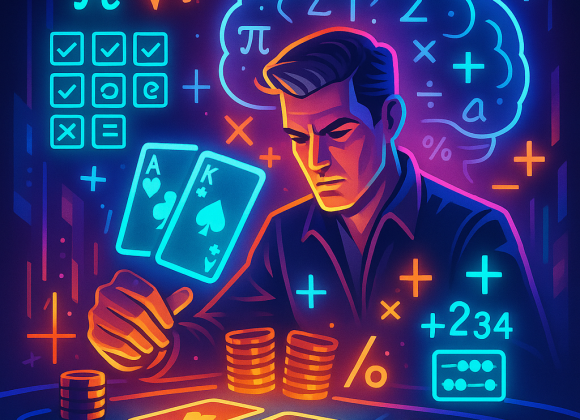When it comes to gambling, many players find themselves entranced by the allure of luck and chance. It’s a thrilling chase, where every spin of the wheel or flip of the card can lead to the sweet taste of victory or the bitter sting of defeat. Yet, lurking beneath the surface of this exhilarating pastime is a psychological trap known as the Gambler’s Fallacy. It’s a delightful yet deceptive notion that keeps players returning for more, often at the cost of their bankroll. Let’s dive into the curious world of gambling psychology to unravel this fallacy and discover why it leads so many astray.
1. The Illusion of Luck: A Gambler’s Delightful Trap
The Gambler’s Fallacy is rooted in the misunderstanding of randomness and probability, where individuals believe that past events influence future outcomes in independent events. Imagine, for instance, a slot machine that has shown a series of losing spins. A player might think, “It’s due for a win!” This belief creates a delightful trap where the player becomes convinced that their luck will change based on previous results.
This illusion is often fueled by the excitement and anticipation of winning. The brain releases dopamine, the pleasure chemical, whenever players engage in gambling activities, amplifying the belief that misfortune must soon be followed by fortune. Unfortunately, this psychological reward can lead to poor decision-making, as players chase losses instead of recognizing the inherent randomness of each individual game.
Moreover, the social environment of gambling, whether at a casino or an online platform, can amplify these fallacies. Players often share stories of near-misses or winning streaks, reinforcing the illusion that luck can be influenced by past outcomes. In a world where every spin feels like a step closer to that elusive jackpot, it’s easy to get lost in the delightful trap of hope.
To illustrate this further, let’s look at the following table that summarizes key concepts related to the Gambler’s Fallacy:
| Concept | Explanation |
|---|---|
| Gambler’s Fallacy | Belief that past outcomes influence future results. |
| Randomness | Each event is independent; past results don’t affect future outcomes. |
| Psychological Reward | Dopamine release reinforces gambling behavior. |
| Social Influence | Shared stories can create false expectations. |
| Independent Events | Every spin or roll is a new chance, unrelated to previous outcomes. |
| Loss Chasing | Pursuing losses can lead to further financial decline. |
2. Odds and Ends: Understanding Probability in Play
Understanding the mechanics of probability is crucial for anyone stepping into the world of gambling. Each game, whether it’s blackjack, roulette, or poker, operates on a specific set of odds that dictate the likelihood of various outcomes. For instance, in a game of roulette, the odds of hitting a specific number on a single spin are always 1 in 37 on a European wheel. Each spin is independent, meaning past spins have no bearing on future results.
Players often misinterpret these probabilities, believing they can predict outcomes based on previous patterns. This confusion stems from a lack of understanding of how probabilities work. For example, if a player sees a number come up several times in a row, they may incorrectly assume the odds of that number appearing again have increased. In reality, the odds remain constant with each spin, and each occurrence is purely coincidental.
Additionally, many games offer a variety of betting options, each with different odds. Knowing these can empower players to make informed choices. A player betting on red or black in roulette has almost a 50% chance of winning, while betting on a single number offers much higher payout odds but lower chances of winning. Understanding these nuances can help players navigate the gambling landscape with more awareness.
Engaging in games without a solid grasp of the odds can lead to setbacks. Players may overestimate their chances of winning, creating a false sense of security that can quickly evaporate when luck turns. Therefore, a foundational understanding of probability is essential for anyone looking to gamble responsibly.
3. Spin Your Wheels: The Cycle of Hope and Despair
The cycle of hope and despair is a common experience for many gamblers, driven largely by the expectations set by the Gambler’s Fallacy. Players enter casinos or log onto betting sites filled with hope, dreaming of hitting it big. Each bet feels like a step closer to that dream, but with every loss, despair creeps in, leading to an emotional rollercoaster that can be hard to escape.
This cycle often encourages players to increase their bets in hopes of recouping losses, a behavior known as “chasing losses.” Instead of recognizing the randomness of their game, they intensify their gambling, often leading to even greater losses. This creates a loop where hope fuels further gambling, and despair follows when reality sets in, leaving players feeling trapped and frustrated.
Moreover, the thrill of winning can quickly overshadow the sting of losing, leading players to downplay their losses. This selective memory can keep them in the cycle, as they focus on past wins while ignoring the big picture of their overall performance. It’s not uncommon for players to recount their victories enthusiastically while glossing over the countless losses that paved the way.
Breaking free from this cycle requires a conscious effort to recognize the fallacy at play. By understanding that each game is independent and that losses are a part of the experience, players can learn to manage their emotions and expectations. Embracing a more balanced perspective can make gambling a more enjoyable and sustainable activity.
4. Chasing Rainbows: Why Hot Streaks Don’t Last
Chasing rainbows is a colorful metaphor for the phenomenon where players become convinced they are on a “hot streak.” This belief often leads them to increase their bets in a bid to capitalize on their perceived lucky streak. However, the truth is that hot streaks are often short-lived and can lead to disillusionment when the inevitable downturn occurs.
Many players mistakenly believe they can predict the continuation of a hot streak based on their recent success. This misconception is rooted in the Gambler’s Fallacy, as players think their recent outcomes will influence future results. In reality, the odds remain the same regardless of previous results, and this belief can lead to significant financial losses when players overextend themselves in pursuit of the rainbow.
Hot streaks can also be psychologically enticing, as they amplify the excitement of gambling. The thrill of winning can create a sense of invincibility, prompting players to take risks they normally wouldn’t. However, this mindset often leads to a dramatic fall when luck inevitably runs out, resulting in a crash from the heights of euphoria to the depths of despair.
To combat the allure of chasing rainbows, players should remember that gambling is inherently unpredictable. Establishing limits and playing within one’s means can help mitigate the risks associated with extending bets during perceived hot streaks. Understanding the nature of luck and the randomness of outcomes can foster a healthier relationship with gambling.
5. The Winning Streak That Never Was: A Playful Myth
The notion of a winning streak is a pervasive myth in the gambling world. Players often recount tales of incredible luck, where they seemingly can’t lose. While these stories may be entertaining, they often mask the reality that winning streaks are statistically improbable and usually temporary.
Despite the excitement surrounding these tales, it’s essential to recognize that the odds in games of chance are designed to favor the house. Players may experience a few wins in a row, but these occurrences are rare when viewed over time. While it’s fun to believe in the possibility of a never-ending winning streak, the odds remind us that downswings are part of the game.
The thrill of recounting a “winning streak” can also influence how players perceive their overall gambling experience. They may focus on the excitement of those wins while neglecting the losses that preceded or followed them. This selective attention reinforces the myth of the winning streak and can lead to poor decision-making in the future.
To embrace a more realistic view of gambling, players should celebrate wins but also acknowledge losses as part of the journey. By keeping a balanced perspective and understanding the statistical realities, they can enjoy the game without falling prey to myths that could lead them astray.
6. Learning to Laugh: Embracing the Game’s Quirks
At the end of the day, the best approach to gambling is to learn to laugh at its quirks. Every spin, every shuffle of the cards, and every roll of the dice is part of a game that thrives on unpredictability. Embracing the eccentricities of gambling can transform the experience from one of stress and obsession to one of enjoyment and entertainment.
Accepting the inherent randomness of gambling allows players to approach the game with a sense of humor. Rather than getting caught up in the stress of winning or losing, players can enjoy the experience for what it is—a fun pastime filled with highs and lows. This perspective not only enhances enjoyment but also promotes responsible gambling habits.
Creating a playful relationship with gambling can also foster camaraderie among players. Sharing stories of outrageous losses or near-misses can create a sense of community, where players bond over the ups and downs of their experiences. Laughter can defuse tension and remind players that, ultimately, it’s just a game.
Incorporating humor into the gambling experience can serve as a helpful reminder of the unpredictability of luck. By keeping the mood light and focusing on the enjoyment of the game rather than the pressure to win, players can cultivate a healthier attitude toward gambling.
Q&A Section
Q: What is the Gambler’s Fallacy?
A: The Gambler’s Fallacy is the belief that past events influence future outcomes in independent events, leading players to think they’re “due” for a win after a series of losses.
Q: How can I avoid falling into the Gambler’s Fallacy?
A: Understanding the nature of randomness and the independence of each game can help. Always remember that each bet is a new opportunity unrelated to past outcomes.
Q: Why do players chase losses?
A: Players may chase losses due to a mix of hope, excitement, and the psychological reward of gambling, leading them to make poor decisions in an attempt to recover their losses.
Q: What is a hot streak, and why is it a myth?
A: A hot streak refers to a series of wins that players may believe will continue. It’s a myth because the odds remain constant, and past wins do not influence future outcomes.
Q: How can I enjoy gambling responsibly?
A: Set clear limits for yourself, understand the odds, and maintain a playful attitude toward the game without letting winning or losing dictate your emotional state.
Q: How can laughter help me in gambling?
A: Embracing the quirks of gambling and sharing humorous stories can reduce stress, foster community, and make the experience more enjoyable, regardless of the outcome.




